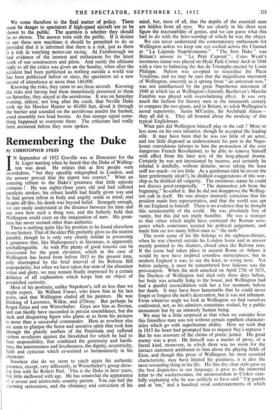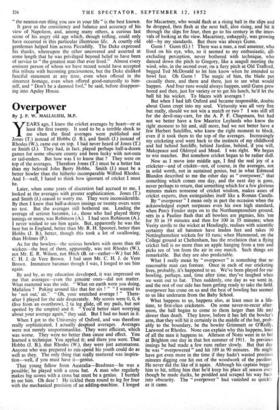Remembering the Duke
By CHRISTOPHER SYKES IN September of 1852 Greville was at Doncaster for the St. Leger meeting when he heard that the Duke of Welling- ton was dead. He relates that at first people were incredulous, " but they speedily telegraphed to London, and the answer proved that the report was correct." What an amazing tribute to the Duke's "greatness that little episode contains ! He was eighty-three years old and had suffered paralytic strokes; his robust health had finally given way and he had grown infirm in body and angrily senile in mind; and despite all this, his death was beyond belief. Strangely enough, we can easily understand at the distance between his time and our own how such a thing was, and the fatherly hold that Wellington could exert on the imagination of men. His great- ness has never seemed other than authentic.
There is nothing quite like his position to be found elsewhere in our history. That of the elder Pitt probably gives us the nearest parallel, though he is only very closely similar in possessing a greatness that, like Shakespeare's in literature, is apparently unchallengeable. As with Pitt plenty of good reasons can be discovered for the great elevation, which in the case of Wellington has lasted from before 1815 to the present time, only interrupted by the brief interval of his Reform Bill unpopularity, but when we have taken due note of the abundant virtue and glory, we may remain finally impressed by a certain defiance of all explanation which keeps him an object of unsatisfied curiosity. Most of his portraits, unlike Napoleon's, tell us less than we might expect. Sir William Fraser, who knew him in his last years, said that Wellington eluded all his painters. He was thinking of Lawrence, Wilkie, and d'Orsay. But perhaps he forgot Goya and one Winterhalter. Goya saw him as Iberian, and can hardly have succeeded in precise resemblance, but the dark and disquieting figure who glares at us from his pictures is more than a successful commander. Here as nowhere else we seem to glimpse the fierce and sensitive spirit that took him through the ghastly warfare of the Peninsula and suffered violent revulsions against the bloodshed for which he had to bear responsibility, that combined the generosity and harsh- ness, the amorousness and lovelessness, the dignity, eccentricity, faith and cynicism which co-existed so harmoniously in his character.
Nowhere else do we seem to catch again his authentic presence, except, very differently, in Winterhalter's group show- ing him with Sir Robert Peel. This is the Duke in later years, but little mellowed with age. He has somewhat the appearance of a severe and aristocratic country parson. You can feel the alarming seriousness, and the obstinacy and conviction of his mind, but, most of all, that the depths of the essential man are hidden from all eyes. We see clearly in his short neat figure the inscrutability of genius, and we can guess what this had to do with the hero-worship of which he was the object. We can never understand the contemporary enthusiasm for Wellington unless we keep one eye cocked across the Channel at " La Ldgende Napoleonienne." " The Iron Duke " was Britain's answer to " Le Petit Caporal " ; Cotes Wyatt's enormous statue was placed on Hyde Park Corner Arch in 1846 with a view to balancing the Arc de Triomphe erected by Louis Philippe. Nelson was co-opted to neutralise the Place Vendome, and we may be sure that the magnificent interment of Wellington, sincerely as it sprung from " an universal woe," was not uninfluenced by the great Napoleonic interment of 1840 at which (as at Wellington's funeral), Beethoven's Marche Funebre was played with overwhelming effect. It was very much the fashion for literary men in the nineteenth century to compare the two giants, and in Britain, to relish Wellington's moral superiority. Justin M'Carthy, Sir Archibald Alison— they all did it. They all boasted about the modesty of this typical Englishman.
What part did Wellington himself play in the cult ? More or less none on his own initiative, though he accepted the -leading role. It may have been that he was too little of an actor, and too little disposed to underestimate his part in the Napo- leonic convulsions (always to him the protraction of the ever dangerous French Revolution), to be able to remove himself With effect from the later acts of the long-played drama: Certainly he was not intoxicated by 'incense, and certainly he inhaled it dutifully, without distaste, never taking the least sniff too much—or too little. As a gentleman (did he invent the later gentlemanly ideal?), he disliked exaggerations of thig wor- ship as he disliked all vulgarity. The enormous statue he could not discuss good-temperedly. " The damnedest job from the beginning," he called it. But he did not disapprove the Welling- ton cult in itself. He was always intensely conscious that his position made him representative, and that the world was apt to see England in himself. There is no evidence that he thought this unreasonable of the world. , He was absolutely free of vanity, but this did not imply humility. He was a stranger to that virtue which might have corrected the Roman arro- gance which sometimes warped his political judgement, and made him see too many fellow-men as ' the mob."
The worst scene of his life belongs to the eighteen-thirties, when he was cheered outside his London home and in answer merely pointed to the shutters, closed since the Reform riots. If the scene had taken place in ancient Rome or Athens it would by now have inspired countless masterpieces, but in modern England it was, to say the least, in wrong taste. Yet before judging, it must be remembered how hideous was the provocation. When the mob attacked on April 27th of 1831, the Duchess of Wellington had died only three days before, her body was actually lying in the house, and Wellington had had a painful reconciliation with her a few moments before her death. It may have been lamentable that he could never forget or forgive the mob's desecration, but it was not inhuman. From whatever angle we look at Wellington we find ourselves confronted, not, as his admirers sometimes wished, by a public monument but by an intensely human being. We may be a little surprised at that when we consider how this friendless man was not without certain repellent character- istics which go with superhuman ability. How we wish that in 1815 his heart had prompted him to request Ney's reprieve ! But he was unaware of the claims of poetic justice. His great enemy was a poet. He himself was a master of prose, of a literal kind, moreover, in which there was no room for the inexact statement attributed to him about the playing fields of Eton, and though this prose of Wellington, his most essential characteristic, may have limited his greatness, it is also the most rewarding thing in his life. His fine dry clear style gave us the best dispatches in our language; it gave us the immortal letter to the washerwoman, the memorandum to Croker care- fully explaining why he was unlikely to have said " Up guards and at 'em," and a hundred vivid understatements of which " the nearest-run thing you saw in your life " is the best known.
It gave us the consistency and balance and accuracy of his view of Napoleon, and, among many others, a curious last scene of his angry old age which, though trifling, could only have occurred in this particular illustrious life. A courtly old gentleman helped him across Piccadilly. The Duke expressed his thanks, whereupon the other uncovered and asserted at some length that he was privileged beyond belief to have been of service to " the greatest man that ever lived." Almost every eminent person of whom we have record would have accepted this tribute with becoming graciousness, but the Duke disliked fanciful statement at any time, even when offered in the sincerest homage, even when offered good-naturedly to him- self, and " Don't be a damned fool," he said, before disappear- ing into Apsley House.



































 Previous page
Previous page